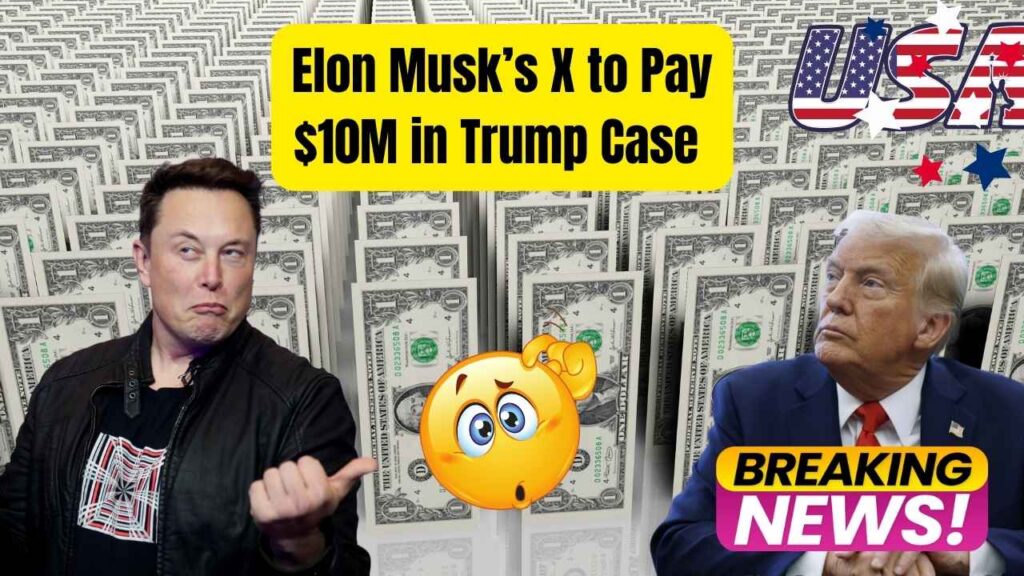Elon Musk’s X to Pay $10M in Trump Case – Elon Musk’s social media platform, X (formerly Twitter), has agreed to pay $10 million in a legal settlement related to former U.S. President Donald Trump’s lawsuit. The case stemmed from the suspension of Trump’s account following the January 6, 2021, Capitol riot.

The lawsuit accused X of violating free speech principles by banning Trump, arguing that the platform unfairly silenced conservative voices. This settlement follows similar cases involving Meta (Facebook, Instagram) and YouTube, highlighting ongoing legal challenges for social media companies in the era of digital free speech.
Elon Musk’s X to Pay $10M in Trump Case
| Topic | Details |
|---|---|
| Settlement Amount | $10 million |
| Company Involved | X (formerly Twitter) |
| Plaintiff | Donald Trump |
| Cause of Lawsuit | Suspension of Trump’s account after January 6, 2021, riot |
| Legal Argument | Alleged censorship of conservative voices |
| Similar Settlements | Meta: $25 million, YouTube case pending |
| Impact on Social Media | Potential changes in moderation policies |
| Future Implications | Legal precedents for digital free speech |
| Reference | WSJ Report |
The $10 million settlement between X and Donald Trump marks another chapter in the ongoing battle over free speech on social media. While it may appear as a win for Trump, social media companies still retain broad control over content moderation. The case highlights the delicate balance between free speech and responsible platform policies in the digital age.
As other tech giants like Meta and Google face similar legal battles, this settlement could set a precedent for future content moderation lawsuits. Regardless of the legal outcomes, the debate over free speech vs. platform responsibility is far from over.
Background: Why Was Trump’s Account Banned?
Donald Trump’s Twitter account was permanently suspended on January 8, 2021, following the Capitol riot two days earlier. Twitter stated that his posts violated the platform’s policy on glorifying violence and could incite further unrest.
This decision sparked a heated debate about the role of social media companies in regulating speech. While some argued that platforms have a responsibility to prevent misinformation and violence, others saw this as unfair censorship of a sitting U.S. president.
In November 2022, after Elon Musk’s acquisition of Twitter, Trump’s account was reinstated following a public poll conducted by Musk. However, Trump did not immediately return to the platform, preferring to use his own social network, Truth Social.
Legal Battle: Trump’s Lawsuit Against X
Trump’s Claims
Trump’s legal team argued that X’s actions:
- Unfairly silenced conservative voices
- Set a dangerous precedent for free speech online
- Violated his First Amendment rights (although X is a private company, not a government entity)
X’s Defense
X defended its decision by citing:
- Violation of its content policies
- Risks of further incitement of violence
- Legal precedent allowing private platforms to moderate content
Ultimately, the lawsuit was settled out of court for $10 million, avoiding a prolonged legal battle.
Political and Financial Implications
Impact on Trump’s Political Influence
- This settlement may bolster Trump’s claims of political censorship, reinforcing his free speech platform ahead of the 2024 Presidential Election.
- It strengthens conservative support, fueling debates on Big Tech bias against right-wing figures.
Financial Impact on X
- $10 million is a significant payout, but Musk’s X has faced larger financial challenges, including revenue drops and ad losses.
- X’s approach to content moderation may influence advertisers’ decisions in the long run.
Musk’s Stance on Free Speech
Elon Musk has positioned himself as a free speech advocate, promoting minimal content moderation. However, balancing advertiser concerns and regulatory scrutiny remains a challenge.
Impact of the Settlement on Social Media Regulation
1. Will This Affect Other Platforms?
This case sets a precedent for social media companies facing lawsuits from public figures. With Meta paying $25 million to settle a similar case, and Google (YouTube) expected to follow, companies may reconsider how they handle high-profile bans.
2. Is This a Win for Free Speech?
While some see the settlement as a victory for Trump, others argue that it does not change platform policies. X, Meta, and Google still have broad authority to regulate content under their Terms of Service.
3. Will This Change Content Moderation Rules?
Social media companies may introduce clearer, more transparent moderation policies to avoid future lawsuits. However, private companies still have the right to set their own rules.
Free Tax Filing at Risk? Elon Musk’s Confusing IRS Comments Explained — Don’t Miss Out
Elon Musk’s Influence in Washington: Leading the Charge on Government Spending Cuts!
IRS Income Tax Refund Schedule for 2025 – Important Dates You Need to Know
FAQs
1. Why did X agree to settle for $10 million?
Settling the case allowed X to avoid lengthy litigation costs and negative press. A court battle could have led to unfavorable legal precedents for social media platforms.
2. What does this mean for Trump’s return to X?
Trump’s account is already reinstated, but he primarily posts on Truth Social. This settlement does not require him to return to X.
3. Could this case impact future lawsuits?
Yes, this case may influence other lawsuits against social media platforms, potentially encouraging more settlements rather than prolonged legal fights.
4. Are other social media companies facing similar lawsuits?
Yes. Meta paid $25 million, and Google (YouTube) is expected to negotiate a settlement soon regarding Trump’s ban.
5. How does this affect content moderation?
While platforms may reconsider their moderation policies, they still have legal rights to enforce their own rules as private companies.







